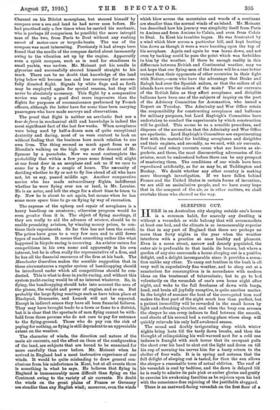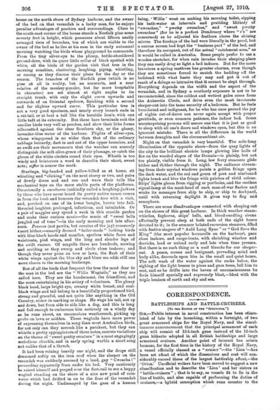SLEEPING OUT.
ERE in an Australian city sleeping outside one's house is a common habit, for scarcely any dwelling is without a verandah or wide balcony that will accommodate at least one bed, and the climate is so immeasurably superior to that in any part of England that there are perhaps no more than forty nights in the year when the weather interferes with a practice at once healthy and pleasant. Even in a mean street, narrow and densely populated, the outer air is preferable to that inside its houses, but where a garden of any size surrounds a house sleeping out is a positivs delight, and a delight incomparable since it provides a sensa- tion unlike any other. To camp out tentless in the bush is all very well in superlatively fine weather, and to sleep out at a sanatorium for consumptives is in accordance with modern ideas on the treatment of tuberculosis ; but to go to bed voluntarily on the verandah of one's own home night after night, and wake to the full freshness of dawn with lungs, head, and brain all joyfully receptive, is quite another matter. In the height of summer the heat of the corrugated iron roof makes the first part of the night much less than perfect, but a patient immobility will be rewarded in the small hours by light and refreshing slumber, and when the busy sun arouses the sleeper he can creep indoors to find between the smooth, cool sheets of his second bed a resting-place where sleep will quickly reinvade his only half-awakened senses.
The sound and doubly invigorating sleep which winter nights bring lasts till the tardy dawn breaks, and then the thought of relinquishing his well-warmed nest for a cold one indoors is fraught with such terror that its occupant pulls the sheet over his head to shut out the light and dozes on till his cup of morning tea nerves him for a hasty return to the shelter of four walls. It is in spring and autumn that the full delight of sleeping out is tasted, for then the sun allows the sleeper a reasonable term of actual oblivion. The roof of his verandah is cool by bedtime, and the dawn is delayed till he is ready to admire its pale pink or amber glories and gently to exercise his awakening faculties as he rejoices upon his bed with the conscience-free rejoicing of the justifiable sluggard.
There is an eastward-facing verandah on the first floor of a house on the north shore of Sydney harbour, and the owner of the bed on that verandah is a lucky man, for he enjoys peculiar advantages of position and surroundings. Close to the south-east corner of the house stands a Norfolk pine some seventy feet in height, which possesses about fifteen neatly arranged tiers of branches, ten of which are visible to the owner of the bed as he lies at his ease in the early autumnal morning watching the birds whose playground be commands. From the tiny silver-eye to the plump, bottle-shouldered ground-dove, with its queer little collar of black spotted with white, all the birds of the garden visit that tree in the morning sunshine, chattering, laughing, piping, whistling, or cooing as they discuss their plans for the clay or the season. The branches of the Norfolk pine (which is no pine at all in reality, but an araucatia, and a near relative of the monkey-puzzler, but far more hospitable in character) are set almost at right angles to its straight trunk, with only the slight curve upwards and outwards of an Oriental eyebrow, finishing with a second and far slighter upward curve. This particular tree is not a very good specimen, and nearly every branch ends in a rat-tail, or at best a tail like the heraldic lion's, with one little tuft at its extremity. But these bare terminals suit the smaller birds very well as perches, and show their lithe forms silhouetted against the clear Southern sky, or the glassy, lavender-blue water of the harbour. Flights of silver-eyes, whose wingspread is no wider than that of the ordinary cabbage butterfly, dart in and out of the upper branches, and so swift are their movements that the watcher can scarcely distinguish the soft olive-green of their plumage, or catch the gleam of the white circlets round their eyes. Whistle is too windy and boisterous a word to describe their short, sweet note; sillier is nearer the mark.
Starlings, big-headed and yellow-billed as at home, sit whistling and " clicking " on the next storey or two, and pairs of dowdy doves nod and coo and wave their tails like mechanical toys on the more stable parts of the platforms. Occasionally a cncuburra (unkindly called a laughing-jackass by those who have never beard its pretty native name) comes in from the bush and honours the verandah tree with a visit, and, perched on one of its lower boughs, bursts into full- throated laughter, prolonged, infectious, and inimitable. Or a pair of magpies may spend a week in this seaside garden and make their curious music—the music of "sweet bells jangled out of tune"—in the early morning and late after- noon. Peewees (not pewits, but cousins of the jay) commonly easort hither,—smartly dressed " tailor-made " looking birds with blue-black hoods and mantles, spotless white faces and waistcoats, pied wings, and the long and slender legs of the swift runner. Of seagulls there are hundreds, mewing and scolding as they swoop and circle close inshore; and though they never poise on tree or lawn, the flash of their white wings against the blue sky and bluer sea adds still one more charm to the morning landscape.
But of all the birds that frequent the tree the most dear to the man in the bed are the "Willie Wagtails," as they are called here. They are the handsomest, the friendliest, and the most entertaining in his aviary of volunteers. The glossy black head, large bright eye, creamy white breast, and coal- black wings and tail belong to a beautifully proportioned bird, strong and graceful, and not quite like anything in the Old Country, either in marking or shape. He wags his tail, not up and down, but from side to side like a dog, and this is long and full enough to embarrass him seriously on a windy day as he runs about, an unconscious weathercock, picking up grubs on lawn or midden. These wagtails have more power of expressing themselves in song than most Australian birds, for not only can they screech like a parakeet, but they can whistle a pretty appoggiatura of three notes, execute variations on the theme of " sweet pretty creature" in a most engagingly melodious chuckle, and in early spring warble a short song not unlike that of a thrush.
It had been raining heavily one night, and the drops still drummed softly on the iron roof when the sleeper on the verandah was suddenly aroused by a loud, gay " Cweacha " proceeding apparently from under his bed. Very cautiously be raised himself and peeped over the foot-rail to see a happy wagtail standing on the shore of a nice new pond of rain- water which had drifted in on to the floor of the verandah during the night. Undismayed by the gaze of a human being, 'Willie' went on making his morning toilet, sipping his bath-water at intervals and prattling blithely of "cweachas," " pwetty cweachan" and "sweet pwetty cweachas" (for he is a perfect Dandreary where " r's" are concerned) as he adjusted his feathers above the shining mirror. The forelegs of the bed were literally in the pond, but a canvas screen had kept the "business part" of the bed, and therefore its occupant, out of the actual "catchment area," as it would be called in Australia. Some people prefer to use a wooden stretcher, for when rain invades their sleeping-place they can easily drag so light a bed indoors. But for the more luxurious a spring mattress has greater charms, even though they are sometimes forced to snatch the bedding off the bedstead with what haste they may and put it out of reach of a deluge so intrusive that it cannot be slept through. Everything depends on the width and the aspect of the verandah, and in Sydney a southerly exposure is not to be recommended, since the coldest and wettest gales come from the Antarctic Circle, and drive even the most inveterate sleeper-out into the tame security of a bedroom. But he feels humiliated and indignant, for he who has once proved the joy of nights out-of-doors can never again accept with proper gratitude, or even common patience, the indoor bed. Some unenterprising persons will assure one that it is just as good to sleep with all one's doors and windows open, but this i3 an ignorant mistake. There is all the difference in the world between draughts and the circumambient air.
Night on that verandah is very beautiful. The mile-long illumination of the opposite shore—from the quay lights of the city to the brilliant electric lamps glowing like balls of fire on the wooded slopes of the Domain—is plainly, but not too plainly, visible from it. Long, low ferry steamers glide hither and thither through the night. The radiance stream- ing from their myriad windows paints a golden fringe upon the dark water, and the red and green of port and starboard lights break and blur the fringe with patches of vivid colour. Ships' lights gleam from rigging or portholes, and the restless signal-lamp at the mast-head of each man-of-war flashes and winks its measeges from ship to ship, or ship to dockyard, until with returning daylight it gives way to flag and semaphore.
There are some disadvantages connected with sleeping out on the shores of this great harbour. In thick weather steam. whistles, foghorns, ships' bells, and blood-curdling sirens effectually prevent sleep at both ends of the eight hours devoted to it; in the summer belated excursion steamers, filled with festive singers of "Auld Lang Sync" or " God Save the King" (the most popular barcarolle on the harbour), pass close inshore, and cargo-boats, with shrieking winches and derricks, load or unload early and late when time presses. But there is no such thing as a nail blanche for our sleeper- oat. A peace, serene and benignant, pervading mini and body alike, descends upon him in the small and quiet hours. The soft wash of the water against the rocks below, the sighing of the light breeze in pines and gum trees, lull him to rest, and as he drifts into the haven of unconsciousness he feels himself specially and supremely blest,—blest with the triple benison of earth and sky and sea.







































 Previous page
Previous page